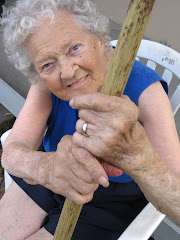The article further states: Many of the results of the survey are similar to those from earlier versions in 2004 and 1999. Two-thirds of caregivers are women. The average age is about 48. Almost all--86 percent--care for a relative. Most often, 36 percent of the time, it's for a parent. On average, caregivers have been providing care for 4.6 years, and three in ten report doing so for five years or more.
..and...
Ginzler says one of the biggest changes to show up in the survey this year is just how much caregiving can interfere with regular work. "Making accommodations in the workplace has increased in several ways," she says. "In most cases, two thirds of them, means they either go in late, leave early or take time off."
Again, all I can say is WELL NO SH__T!! And I DO mean the SH__ word because I'm disgusted with studies like this and no other word expresses my disgust better than that. Growing up it seemed that everyone I knew was involved in helping an elderly parent, grand parent, relative or neighbor. It's just what you DID - it's what you DO because it's the RIGHT thing to do. Why do we need studies to prove it? Don't these decision makers look around at their own families and those of their employees?
I'm sure this study is well intended. I know that the AARP and MetLife want to track trends, but if you got the same results in 1999 and 2004 - please DO SOMETHING PRACTICAL TO HELP! Here are a few ideas:
- Give them half or full pay for hours worked on programs to repair homes of elderly residents or to install ramps, tubs, counters, - any repair or remodel that helps people age in place.
- Encourage employers to look at the WHOLE value of an employee and NOT penalize them with lower wages for flex time.
- Pay for respite care so your care-giving employees can have a day off away from work AND family responsibilities
- Give tax credits to people who work to keep their parents OUT of nursing homes, the requirement to provide 50% of their support is too high too meet given social security and pension incomes
- Sponsor care giver clinics to help people understand the legal issues that might come up when helping elderly parents and to identify what type of help is available to their parent/relative/neighbor
As our representatives in the US House and Senate fight over health care, I hope that they will be wise enough to look at the WHOLE picture and give some relief to those of us who just do the right thing. I hope they would encourage companies to do things like this rather than listen to the insurance industry hacks who are worried about enrolling young, healthy people at the highest rate possible. Most of us work for other people on their schedules. In between those work hours, we raise kids, we clean, we cook, we help our families and each other. We deserve a break!
To find the radio segment or read the article follow this link to National Public Radio (NPR):
http://www.npr.org/blogs/health/2009/12/caring_for_elderly_and_disable.html.





